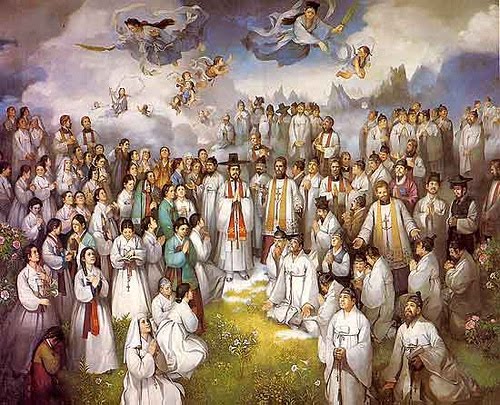The Peninsula
The Necessity of Religious Freedom in the Development & Future of the Korean Peninsula
Published November 9, 2012
Author: Nicholas Hamisevicz
Category: North Korea, Inter-Korean, South Korea

By Nicholas Hamisevicz
The feast day of Saints Andrew Kim Taegon, Paul Chong Hasang and companions occurred this week on September 20. The celebration of these Korean saints demonstrates the development of religious freedom on the Korean peninsula. Moreover, religion and religious freedom need to be promoted as positive aspects for solving issues in unifying the two Koreas.
The symbolism of South Koreans being able to practice their own religious beliefs should not be overlooked. Saints Andrew Kim Taegon, Paul Chong Hasang and their companions were killed for their Catholic beliefs during a time when Confucianism was the only religion permitted in a united Korea. However, the Korean peninsula is now split, and South Korea has developed into a democracy that allows for religious freedom. South Korea is rightly proud of this development model, and it should accentuate the important religious freedom aspects of that rise.
Although North Korea does not permit the free exercise of religious beliefs and practices, religion has been a way for the two Koreas to meet. Granted, the North Korean religious members are connected directly with the government. However, when the meetings do occur, they provide South Koreans another access point for talking with North Korea. Furthermore, Kaesong, the industrial complex inside North Korea where some South Korean companies employ North Korean workers, has a temple inside its area. There are a few reports suggesting worship has taken place at the temple, but South Korea should examine more ways to utilize the temple for proper worship inside Kaesong. The North Korean regime does a good job of censoring information its sees as dangerous to the leadership, like religion, from its people. Yet there are numerous reports and interviews with defectors that indicate once true information does reach the North Korean people, the message and impact can be powerful. This demonstrates the need for South Korea and its friends, like the United States, to emphasize that religious freedom is a vital part of the development process that has left a stark contrast in the current economic, political, and sociological environments of the two Koreas.
Religious freedom and the work of religious groups will also be needed if there is a collapse in North Korea and as the difficult process toward unification unfolds. Father Robert Barron of Word On Fire Catholic Ministries describes how the “systematic denial of the Creator God” leads directly to “the negation of equality and the suppression of human rights,” and that this process is one of the first tactics used by ruthless dictators. The Kim family regime in North Korea has done the same thing. This process will need to be reversed during unification, and the proper role and engagement from religious groups and communities will help bring about that renewal of equality, freedom, and human rights.
A collapse of any kind in North Korea will create an enormous humanitarian crisis where millions of malnourished and impoverished people will be fleeing troubled areas searching for assistance. Aid groups will be trying to reach those in need in a region that has terrible road and transportation infrastructure, limited power, and few telecommunication capabilities. From natural disasters to war-torn areas, religious groups and religious based NGOs have been some of the most effective and courageous vehicles for providing aid relief to anyone in need. Even in the most peaceful of collapses in North Korea, South Korea will still need all the help it can get to provide for the North Korean people, and the South Korean government should not be afraid to call on religious groups for help.
At its best, religion and religious organizations can help improve the situation on the Korean peninsula. Freedom of religion is an important part of South Korea’s vibrant democracy and illustrates the clear contrast to its Northern brethren. When possible, religious meetings provide another avenue for interaction between North and South Korea. Yet, religious freedom will be most necessary during a unification process. It is a basis needed to switch from suppressing to elevating human rights over the whole Korean peninsula. This will also allow a more encouraging and trusting atmosphere for religious organizations and groups to provide the care and assistance to all those in need during and after the unification process. Thus, as we remember the lives of Saints Andrew Kim Taegon, Paul Chong Hasang and companions, we should celebrate the importance of religious freedom, both in its present role in South Korea and in its necessity for future unification of the Korean peninsula.
Nicholas Hamisevicz is the Director of Research and Academic Affairs for the Korea Economic Institute. The views represented here are his own.
